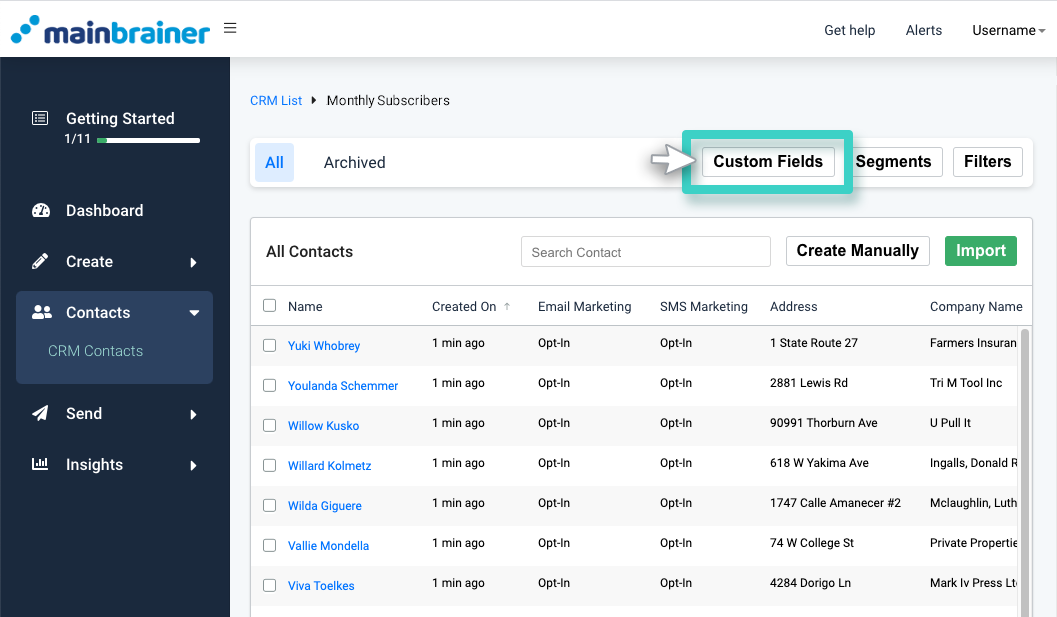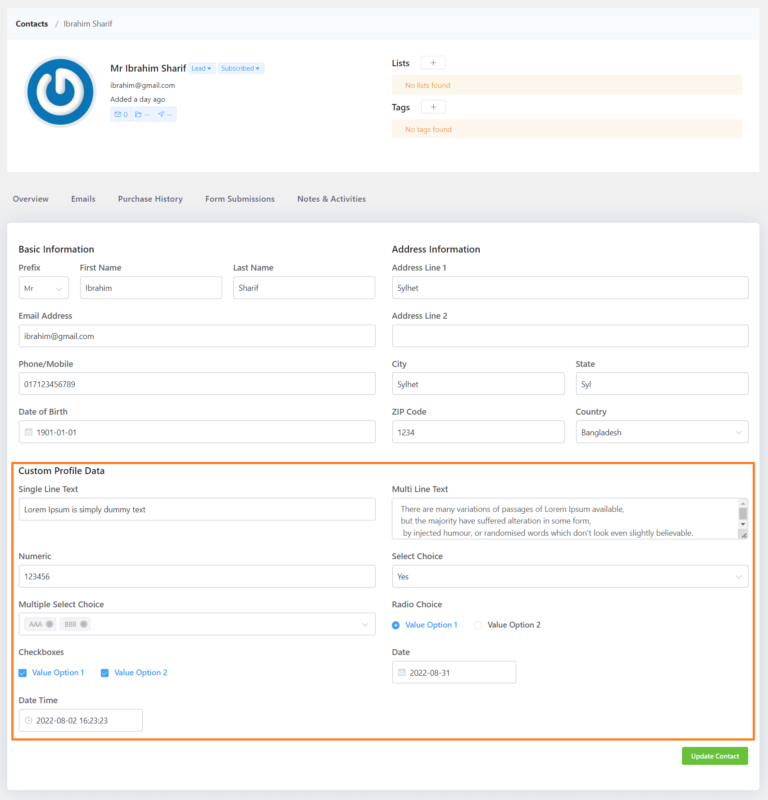
Unlock Deeper Customer Insights: The Power of Customizable Contact Fields in CRM
In today’s hyper-competitive business landscape, understanding your customers is no longer a luxury – it’s a necessity. Generic customer profiles and one-size-fits-all marketing approaches simply don’t cut it. To truly connect with your audience, build lasting relationships, and drive revenue, you need a Customer Relationship Management (CRM) system that empowers you to capture and analyze granular, relevant data. This is where the power of customizable contact fields comes into play.
The Limitations of a Standard CRM
Most CRM systems offer a standard set of contact fields: name, email, phone number, address, company, job title, and perhaps a few others. While these fields provide a basic overview, they often fall short of capturing the unique characteristics and preferences that define your customers. Relying solely on standard fields leaves you with a superficial understanding of your audience, hindering your ability to personalize interactions, tailor marketing campaigns, and anticipate customer needs.
Why Customizable Contact Fields Matter
Customizable contact fields allow you to go beyond the basics and create a CRM that reflects the specific nuances of your business and your customers. They enable you to capture data points that are directly relevant to your industry, target market, and sales processes. By tailoring your CRM to your unique needs, you can unlock a wealth of customer insights that would otherwise remain hidden.
Here’s a closer look at the key benefits of customizable contact fields:
-
Enhanced Customer Segmentation: Standard fields often limit your ability to segment your customer base effectively. Customizable fields allow you to create highly specific segments based on criteria that matter most to your business. For example, an e-commerce company might create custom fields for "Favorite Product Category," "Purchase Frequency," and "Average Order Value." This enables them to target customers with personalized product recommendations and promotions based on their individual preferences and buying habits.
-
Improved Personalization: Customers today expect personalized experiences. By capturing granular data through custom fields, you can tailor your communications, offers, and interactions to resonate with each individual. Imagine a financial advisor using custom fields to track a client’s "Risk Tolerance," "Investment Goals," and "Time Horizon." They can then use this information to provide personalized investment advice and build a stronger, more trusting relationship.
-
More Effective Marketing Campaigns: Generic marketing campaigns often result in low engagement and wasted resources. Customizable contact fields allow you to create highly targeted campaigns that speak directly to the needs and interests of specific customer segments. For instance, a software company might use custom fields to track a lead’s "Industry," "Company Size," and "Specific Pain Points." This enables them to deliver tailored marketing messages that address the lead’s unique challenges and demonstrate the value of their software solution.
-
Streamlined Sales Processes: Customizable fields can help your sales team qualify leads more effectively, understand customer needs more deeply, and close deals faster. For example, a sales rep might use custom fields to track a lead’s "Budget," "Decision-Making Authority," and "Timeline for Purchase." This information allows them to prioritize leads, tailor their sales pitch, and address any potential objections.
-
Better Customer Service: When customer service representatives have access to a comprehensive view of each customer’s history, preferences, and past interactions, they can provide more efficient and personalized support. Customizable fields can capture important information such as "Product Issues," "Support Requests," and "Customer Satisfaction Scores," enabling support teams to resolve issues quickly and improve customer loyalty.
-
Data-Driven Decision Making: The insights gained from customizable contact fields can inform a wide range of business decisions, from product development to pricing strategies to marketing investments. By analyzing the data captured through custom fields, you can identify trends, uncover opportunities, and make more informed decisions that drive growth and profitability.
Examples of Customizable Contact Fields by Industry
The specific custom fields you create will depend on your industry and business model. Here are a few examples of how different industries can leverage customizable contact fields:
- Real Estate: "Preferred Location," "Budget Range," "Desired Property Type," "Number of Bedrooms," "Move-in Timeline."
- Healthcare: "Medical History," "Allergies," "Insurance Provider," "Preferred Doctor," "Appointment Preferences."
- Education: "Program of Interest," "GPA," "Test Scores," "Financial Aid Needs," "Extracurricular Activities."
- Nonprofit: "Donation History," "Volunteer Interests," "Event Attendance," "Communication Preferences," "Relationship to the Organization."
- E-commerce: "Favorite Product Category," "Purchase Frequency," "Average Order Value," "Shipping Preferences," "Payment Method."
Best Practices for Implementing Customizable Contact Fields
While the potential benefits of customizable contact fields are significant, it’s important to implement them strategically to avoid creating a cluttered and confusing CRM. Here are some best practices to keep in mind:
-
Define Your Goals: Before you start creating custom fields, take the time to define your goals. What information do you need to capture to better understand your customers, improve your marketing efforts, or streamline your sales processes?
-
Focus on Relevance: Only create custom fields that are directly relevant to your business and your customers. Avoid capturing data that is unnecessary or that you won’t use.
-
Keep it Simple: Use clear and concise field names that are easy for your team to understand. Avoid using jargon or technical terms.
-
Use Appropriate Field Types: Choose the appropriate field type for each custom field. Options include text fields, number fields, date fields, dropdown menus, and checkboxes.
-
Provide Clear Instructions: Provide clear instructions for your team on how to use each custom field. This will help ensure that data is entered consistently and accurately.
-
Train Your Team: Train your team on the importance of capturing accurate and complete data in the custom fields. Emphasize the benefits of using this data to improve customer relationships and drive business results.
-
Regularly Review and Update: Review your custom fields regularly to ensure that they are still relevant and useful. Update them as needed to reflect changes in your business or your customers.
-
Data Privacy and Compliance: Be mindful of data privacy regulations (such as GDPR or CCPA) and ensure that you are collecting and using customer data in a compliant manner. Obtain consent where necessary and provide customers with the option to opt out of data collection.
Conclusion
In today’s customer-centric world, businesses need to go beyond generic customer profiles and gain a deeper understanding of their audience. Customizable contact fields in CRM systems provide a powerful tool for capturing granular, relevant data, enabling you to personalize interactions, tailor marketing campaigns, and drive revenue. By implementing customizable contact fields strategically and following best practices, you can unlock a wealth of customer insights and build stronger, more lasting relationships. Embrace the power of customization and transform your CRM into a valuable asset for understanding and engaging with your customers.

